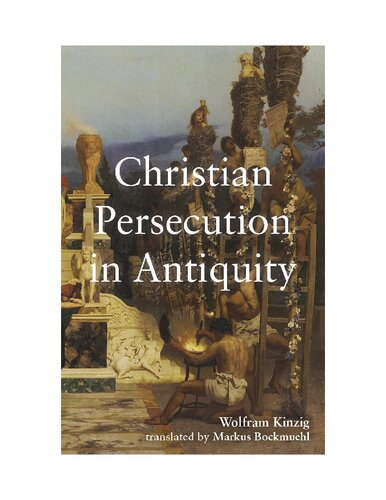

Most ebook files are in PDF format, so you can easily read them using various software such as Foxit Reader or directly on the Google Chrome browser.
Some ebook files are released by publishers in other formats such as .awz, .mobi, .epub, .fb2, etc. You may need to install specific software to read these formats on mobile/PC, such as Calibre.
Please read the tutorial at this link: https://ebookbell.com/faq
We offer FREE conversion to the popular formats you request; however, this may take some time. Therefore, right after payment, please email us, and we will try to provide the service as quickly as possible.
For some exceptional file formats or broken links (if any), please refrain from opening any disputes. Instead, email us first, and we will try to assist within a maximum of 6 hours.
EbookBell Team

0.0
0 reviewsFor centuries into the Common Era, Christians faced social ostracism and suspicion from neighbors and authorities alike. At times, this antipathy erupted into violence. Following Christ was a risky allegiance: to be a Christian in the Roman Empire carried with it the implicit risk of being branded a traitor to cultural and imperial sensibilities. The prolonged experience of distrust, oppression, and outright persecution helped shape the ethos of the Christian faith and produced a wealth of literature commemorating those who gave their lives in witness to the gospel.
Wolfram Kinzig, in Christian Persecution in Antiquity, examines the motivations and legal mechanisms behind the various outbursts of violence against Christians, and chronologically tracks the course of Roman oppression of this new religion to the time of Constantine. Brief consideration is also given to persecutions of Christians outside the borders of the Roman Empire. Kinzig analyzes martyrdom accounts of the early church, cautiously drawing on these ancient voices alongside contemporary non-Christian evidence to reconstruct the church’s experience as a minority sect. In doing so, Kinzig challenges recent reductionist attempts to dismantle the idea that Christians were ever serious targets of intentional violence. While martyrdom accounts and their glorification of self-sacrifice seem strange to modern eyes, they should still be given credence as historical artifacts indicative of actual events, despite them being embellished by sanctified memory.
Newly translated from the German original by Markus Bockmuehl and featuring an additional chapter and concise notes, Christian Persecution in Antiquity fills a gap in English scholarship on early Christianity and offers a helpful introduction to this era for nonspecialists. Kinzig makes clear the critical role played by the experience of persecution in the development of the church’s identity and sense of belonging in the ancient world.